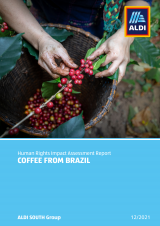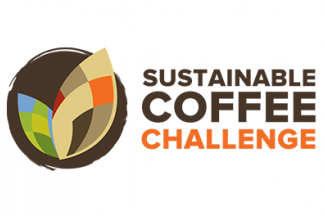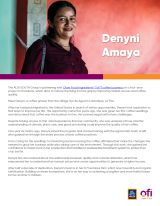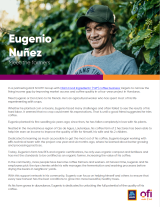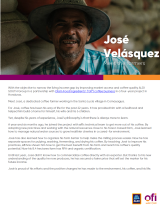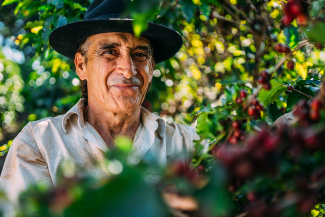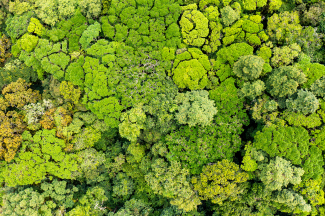
Coffee
Our Approach
Coffee is among the world’s most-traded raw materials and is primarily cultivated by smallholder farmers in sub-tropical regions. There are human rights and environmental challenges when sourcing coffee and the ALDI SOUTH Group is committed to changing this by fostering fair working conditions and environmentally friendly production in the cultivation of coffee.
One of the ways we do this is by sourcing independently certified products to ensure that producers receive a fair price for their products as well as adapt to climate change and fighting deforestation. We also carry out origin visits to key sourcing countries, participate in projects on the ground and are working to improve supply chain transparency via direct sourcing models.
Our Actions
Transparency
We attach great importance to sustainable production conditions in the manufacturing of food and non-food products. Supply chain transparency is the foundation for all our sustainability measures. Without the knowledge where our products come from, we cannot ensure compliance with our requirements, analyse risks, monitor or implement projects. We work with our business partners to increase the transparency of our supply chains so that we have a better understanding of the origins of the products we sell and the raw materials we use in our products.
In 2023, we published the names and addresses of our direct business partners (tier 1 suppliers) for coffee.
Certification and Standards
Smallholder farmers in coffee-growing regions face multiple challenges, including poverty, commodity price fluctuations and the effects of climate change. By sourcing from suppliers using the sustainability standards Fairtrade, Fairtrade USA, and Rainforest Alliance, we can reassure our customers that we are supporting coffee growing communities and protecting biodiversity.
Supply Chain
Visits and Assessment
As part of our engagement, we regularly visit and assess production sites together with our business partners in our food and non-food supply chains.

Human Rights
We respect human rights and do our part to improve living and working conditions throughout our supply chains.
Human Rights Risk Assessment

We regularly conduct human rights risk assessments to examine the human rights risks within our food and agriculture supply chains. The aim of these assessments is to identify any adverse impacts our company may have on human rights, gain insights into our actual impacts and understand how we may be involved through our own activities or as a result of our business relationships.
We determined coffee as a raw material with a high risk of adverse impacts on the enjoyment of human rights and consider it most important to the ALDI SOUTH Group.
Human Rights Impact Assessment
We are developing specific measures to prevent or mitigate adverse human rights impacts identified during our risk assessment in 2018. ALDI has committed to carry out detailed human rights impact assessments (HRIAs) that follow a stringent methodological approach, including extensive background research and engagement with rightsholders. Through these studies, we strive to identify, understand and assess the potential and actual adverse impacts of our business activities on workers and other affected rightsholders, such as community members, smallholder farmers and women. We have published the results of three HRIAs in selected high-priority raw materials, including Coffee.
Direct sourcing
Project on the ground: Fairtrade Coffee Project
The direct sourcing approach originated from a project on the ground implemented by Fairtrade in Honduras and funded by ALDI (2016-2022). The project
- improved the income situation of smallholder farmers
- increased sustainable coffee production
- promoted the participation of women, young people, children, and the indigenous population in Honduras
This was achieved through the:
- implementation of climate change adaptation practices
- increased awareness about glyphosate application
- production of organic fertilisers
- empowerment of women through leadership roles and education in sustainable agriculture
- strengthening of organisations through policies and training, and
- income diversification
| 2016 - 2019 | 2020 - 2022 | Beneficiaries: |
|---|---|---|
| 22 | 16 | Organisations and producer members of small to medium size cooperatives |
| 4,540 | 2,368 | Direct participants (smallholders and workers) |
| 18,160 | 11,669 | Indirect beneficiaries (e.g. family members) |
| 22% | 24% | Female smallholders |
| 78% | 76% | Male smallholders |
Direct Sourcing Approach
Following the project, ALDI SOUTH Group’s own coffee roaster established a sourcing relationship directly with cooperatives in Honduras and was even able to scale up such relationships to Peru. This connection is allowing ALDI to continue to have a positive impact in some of ALDI’s most important coffee sourcing regions.
Direct sourcing coffee comprises any raw (green) coffee that has been negotiated, purchased, and imported by ALDI’s coffee roaster from the respective country of origin, without the intervention of third parties or middlemen and the transfer of ownership takes place latest at the port of shipment.
It is not to be confused with being sourced directly from the producer, as these are in most cases (90%) smallholders and do not produce enough coffee to export directly, but rather through associations, groups, or cooperatives, which trade and export on their behalf.
Direct sourcing simplifies a complex value chain, bringing the producer and the final consumer closer together, and increases the transparency of coffee supply chains. The direct sourcing relationships are built on trust and designed to offer both parties long-term security.
ALDI coffee products
Directly sourced coffee is currently available in selected ALDI coffee products and is Fairtrade-certified and carries a Fairtrade premium. This is paid to cooperatives for each Fairtrade product and enables solutions to be found for the increasing challenges in coffee production and ensures the long-term sustainability of smallholder coffee production in Honduras and Peru. Through these efforts, farmers will become more resilient and prosperous so that a daily cup of coffee purchased from ALDI remains sustainable for all.
The location of our partner cooperatives can be found on the map below.

Location: Corquin, Copán (Honduras)
Cafés Finos Corquín (CAFICO)
# of members: 135 (108 male, 27 female)
Participation in Project since: 2019
Key activities in the Project:
- Organisational Strengthening
- Climate Change and Agro-ecology
- Vegetable Gardens
- Women Group
- Emergency Aid after the Hurricanes
Location: Jimilile, Corquin, Copán (Honduras)
Cafés Especiales Corquin (CAFESCOR)
# of members: 440 (353 male, 87 female)
Participation in Project since: 2017
Key activities in the Project
- Organisational Strengthening
- Climate Change and Agro-ecology
- Vegetable Gardens
- Women Group

Location: La Labor, Ocotepeque (Honduras)
Cafetalera Ecológica La Labor (COCAFELOL)
# of members: 440 (356 male, 84 female)
Participation in Project since: 2017
Key activities in the Project:
- Organisational Strengthening
- Climate Change Adaptation and Agro-ecology
- Vegetable Gardens

Location: San Luis, Santa Bárbara (Honduras)
Mixta Montaña Verde (Montaña Verde)
# of members: 149 (131 male, 18 female)
Participation in Project since: 2019
Key activities in the Project:
- Organisational Strengthening
- Climate Change and Agro-ecology
- Living Income

Location: Marcala, La Paz (Honduras)
Regional Mixta De Agricultores Orgánicos De La Sierra (RAOS)
# of members: 233 (165 male, 68 female)
Participation in Project since: 2016
Key activities in the Project:
- Organisational Strengthening
- Climate Change and Agro-ecology
- Women and Youth Groups
- Vegetable Gardens
- Child Protection
Testimonial
“The importance of the project is that it supports the initiatives of young people and enhances their skills and capacities. In this way we promote hope and show that emigration from our country is not the only option. We hope that the project can support us further on marketing, so that we can make these ideas a reality and feel that our efforts have been worthwhile. The support is relevant at all times, the financial planning and the technical and administrative advice, this is why our plants grow well. Our hope is to grow. The achievements are already palpable, as is the motivation and the commitment of the youth. We know that there are many projects of great relevance, but this particular project is ours, and that's what makes the difference. We are committed to show how we want to go forward.”
Franco Mejía
RAOS Youth Group
Pedernales, La Paz

Location: Santa María del Real, Olancho (Honduras)
Cafetalera Olancho Limitada (COCAOL)
# of members: 73 (55 male, 18 female)
Participation in Project since: 2016
Key activities in the Project:
- Organisational Strengthening
- Climate Change and Agro-ecology

Location: Peña Blanca, Santa Cruz de Yojoa, Cortés (Honduras)
Empresa de Servicios Multiples Los Laureles (GOBENEP)
# of members: 33 (24 male, 9 female)
Participation in Project since: 2019
Key activities in the Project:
- Climate Change and Agro-ecology
- Women and Youth Groups
Testimonial
“The planning of the new project seems to me to be very good because we are taking into account more indicators to be fulfilled compared to the previous project. The planning enables us to implement the project ideally, because all participating cooperatives work together in a synchronised way. Furthermore, the CHPP facilitates the implementation. I really like the trainings and I am convinced that, because of the planning as we are doing it, the indicators are going to be fulfilled!”
Arbey Mejía Guzmán
President of the Board of Directors of GOBENEP
Los Laureles, Santa Bárbara Honduras

Location: San José de Colinas, Santa Bárbara (Honduras)
Cafetalera Agropecuaria San José Limitada (COCASJOL)
# of members: 253 (187 male, 66 female)
Participation in Project since: 2016
Key activities in the Project:
- Women and Youth Groups
- Climate Change and Agro-ecology

Location: Sesesmil II, Copán Ruinas, Copán (Honduras)
Agrícola de Productores Orgánicos de Copán, Limitada (COAPROCL)
# of members: 46 (38 male, 8 female)
Participation in Project since: 2020
Key activities in the Project:
- Agro-ecology
- Investments in Quality
- Emergency Aid after the Hurricanes

Location: El Rosario La Labor Ocotepeque (Honduras)
Cafetalera ecológica el Rosario limitada (COCAEROL)
# of members: 94 (77 male, 17 female)
Participation in Project since: 2019
Key activities in the Project:
- Climate Change and Agro-ecology

Location: Gualcinse, Lempira (Honduras)
De Servicios Agropecuarios Gualcinse, Limitada (COSAGUAL)
# of members: 129 (103 male, 26 female)
Participation in Project since: 2016
Key activities in the Project:
- Organisational Strengthening
- Climate Change and Agro-ecology
- Women and Youth Groups
Location: Gualtaya, Sensenti, Ocotepeque (Honduras)
De Producción Agropecuaria De Campesinos Flor Del Pino Limitada
# of members: 32 (28 male, 4 female)
Participation in Project since: 2017
Key activities in the Project:
- Organisational Strengthening
- Climate Change and Agro-ecology
- Women and Youth Groups
- Income Diversification
Testimonial
“The process of evaluation of the project financed by ALDI seems to be excellent since it takes into account very important issues for our organisations. Special attention is paid to the participation of people responsible for decision making as well as employees of the organisations. The expected results are very important for us and our organisations, for instance in terms of organisational improvement and income diversification. It is seen at the level of all organisations how important this follow-up project is for us and how the organisations are developing through the support of the project.”
Beronica Gabarrete
Administrator of Flor del Pino
Gualtaya, Sensenti, Ocotepeque Honduras
Stakeholder Dialogue & Capacity Building
We believe the best way to protect the people and the environment is through joint initiatives and partnerships. For this reason, we engage in various multi-stakeholder initiatives, sourcing collaborations and projects on the ground.
Project on the ground: Living income gap
The ALDI SOUTH Group is partnering with OFI's ("Olam Food Ingredients") on a four-year project in Honduras, which aims to narrow the living income gap by improving market access and coffee quality.
The global coffee supply chain is very complex. To get the coffee beans to port for export, they are typically bought and sold by several intermediaries. On top of this, low yields, fluctuating prices and the climate crisis can make it even harder for farmers to earn a reliable income.
The new joint project aims to create a transparent and traceable coffee supply chain all the way to farm level, and narrow the living income gap of 1,000 coffee producers in Honduras by helping them to increase yields, improve coffee quality and achieve Rainforest Alliance certification. Local representatives and farmers will be trained with an innovative smartphone app that enables them to make informed decisions and directly trade their coffee with OFI. Over four years, each farmer will receive tailored trainings, agricultural inputs and tools to help narrow the living income gap.
Tracking the project’s progress will ensure we are not only meeting our shared goals but learning how to make our impact scalable in a way that lifts farmers out of poverty, and that offers a more promising future for generations to come.
Impact Stories
Danyni, Eugenio and José are three Honduran farmers that shared their project impact stories with ALDI and OFI.
Project on the ground: Ethical recruitment on coffee farms in Brazil
Following the development of the Human Rights Impact Assessment (HRIA) action plan, ALDI is partnering with the non-profit civil society organisation Verité on a pilot project on “Promoting Ethical Recruitment in the Coffee Sector of Minas Gerais, Brazil” within Verité’s U.S. Department of Labor-funded Cooperation On Fair, Free, Equitable Employment (COFFEE) Project.
After conducting an HRIA on coffee in Brazil in 2021, ALDI is excited to be able to take immediate action through participating in Verité’s project in Brazil. The aim of this pilot is to better understand and respond to recruitment and labour risks in the Brazilian coffee sector.
The effort is part of Verité’s “COFFEE” Project, which includes pilot projects in Mexico, Colombia and Brazil, along with the development of an open-source Socially Sustainable Sourcing Toolkit (S3T) and online training modules focused on promoting decent labour conditions and fair recruitment in the coffee sector. The tools will be piloted by ALDI and its supply chain actors, such as coffee roasters, traders, and farms.
Together, we are looking forward to improving the adoption and successful execution of ethical and sustainable sourcing practices in coffee supply chains, promoting acceptable working conditions by strengthening the knowledge and capacities of key actors in the supply chain, and supporting the elimination of child labour and forced labour in the coffee sector.
Our CR Performance
Our Goal: The percentage of sustainable coffee is to be steadily increased.
News
Library
Sustainable Development Goals
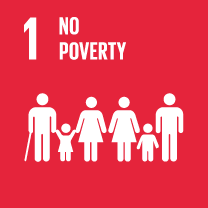
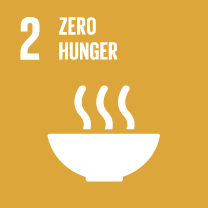
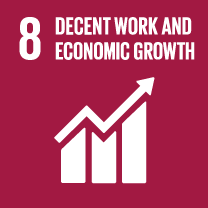
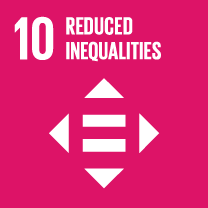
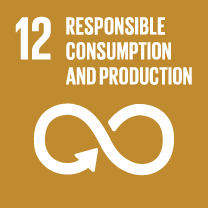
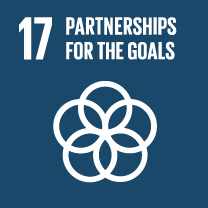
UNGC
Human Rights
Principle 1
Support and respect the protection of human rights
Principle 2
Not complicit in human rights abuses
Labour
Principle 3
Uphold freedom of association and recognition of right to collective bargaining
Principle 4
Elimination of forced and compulsory labour
Principle 5
Abolition of child labour
Principle 6
Elimination of discrimination in respect of employment and occupation
